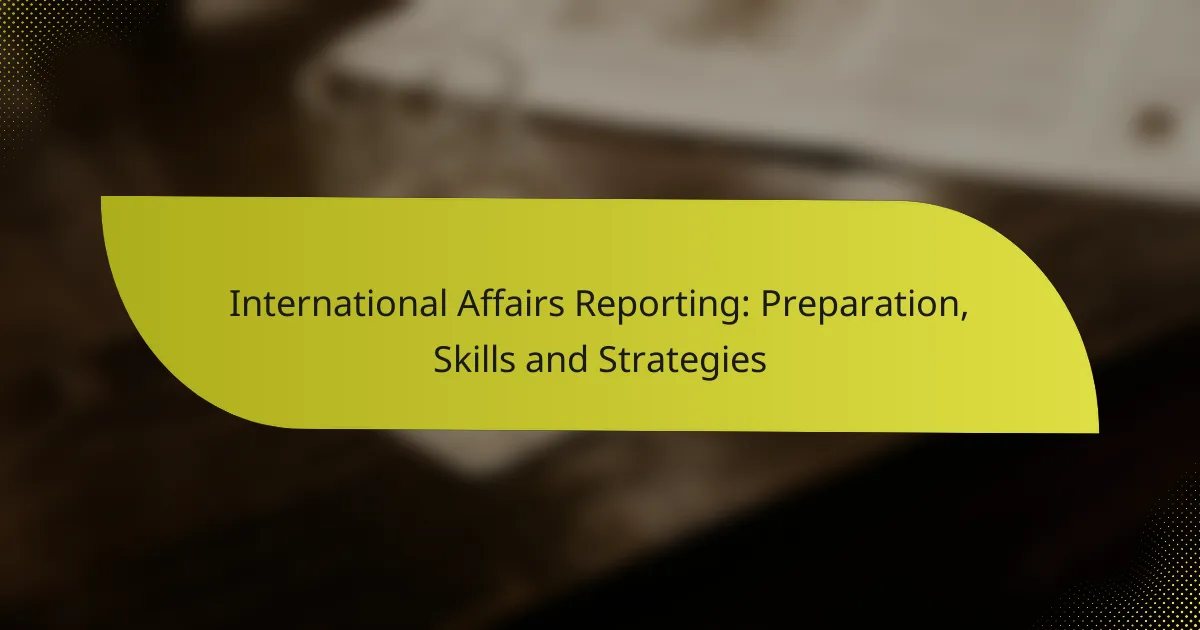International affairs reporting requires a unique blend of skills, including analytical thinking, cultural awareness, and language proficiency, to navigate the complexities of global issues. Preparation for this field involves education, practical experience, and staying informed, which together equip reporters to deliver accurate and insightful coverage. By employing diverse sourcing and engaging with communities, journalists can enhance the depth and credibility of their reporting on international topics.
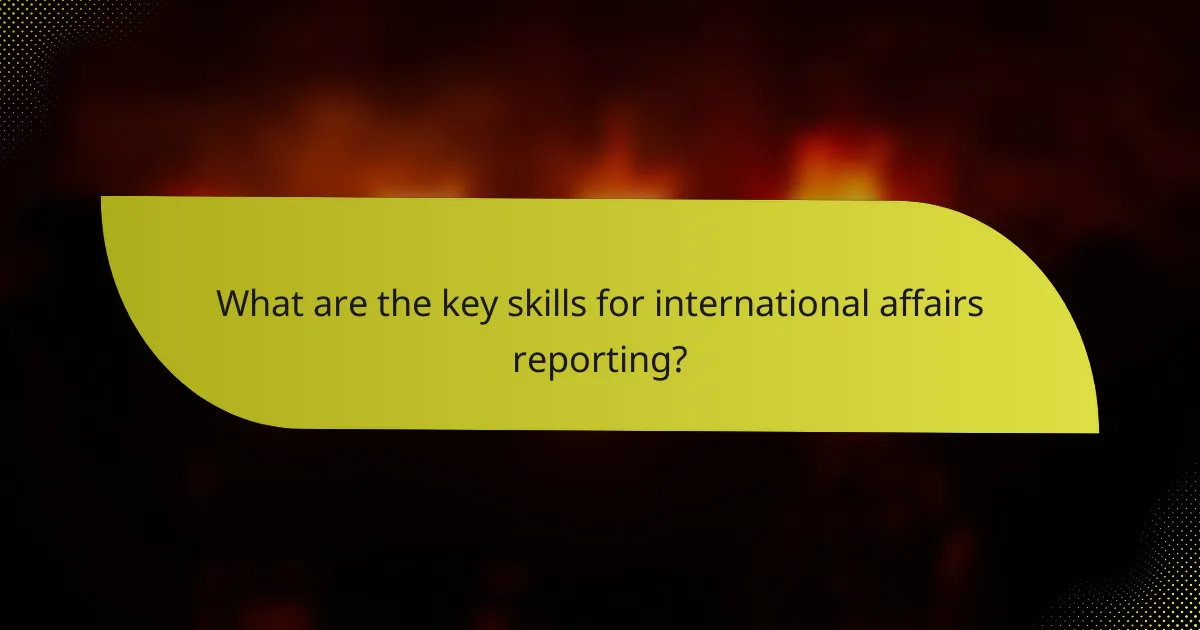
What are the key skills for international affairs reporting?
Key skills for international affairs reporting include analytical thinking, cultural awareness, language proficiency, research skills, and communication skills. Mastering these abilities allows reporters to effectively cover complex global issues and convey accurate information to their audience.
Analytical thinking
Analytical thinking is crucial for international affairs reporting as it enables journalists to dissect complex information and identify underlying trends. Reporters must evaluate sources critically and assess the credibility of data to provide nuanced coverage of global events.
To enhance analytical skills, practice breaking down news stories into their components, such as causes, effects, and stakeholder perspectives. This approach helps in understanding the broader implications of events on international relations.
Cultural awareness
Cultural awareness is essential for accurately reporting on international affairs, as it helps journalists understand the context and significance of events in different regions. Being sensitive to cultural nuances can prevent misinterpretations and foster respectful communication.
To develop cultural awareness, engage with diverse communities, read literature from various cultures, and stay informed about global customs and practices. This knowledge enhances the ability to report on issues with depth and empathy.
Language proficiency
Language proficiency is a valuable asset in international affairs reporting, as it allows journalists to communicate directly with sources and access information in its original context. Fluency in multiple languages can significantly broaden a reporter’s reach and understanding of global issues.
Consider learning languages that are relevant to the regions you cover. Even basic proficiency can facilitate interviews and improve the quality of reporting by providing insights that might be lost in translation.
Research skills
Strong research skills are vital for international affairs reporters to gather accurate information and verify facts. Journalists must navigate various sources, including academic articles, government reports, and expert opinions, to build a comprehensive understanding of complex topics.
Utilize online databases, libraries, and reputable news outlets to enhance research capabilities. Keeping organized notes and maintaining a list of reliable sources can streamline the reporting process and improve accuracy.
Communication skills
Effective communication skills are essential for conveying complex international issues clearly and engagingly. Reporters must be able to write compelling narratives, conduct interviews, and present information in a way that resonates with their audience.
To improve communication skills, practice writing regularly, seek feedback, and refine your storytelling techniques. Understanding your audience’s preferences can also guide how to present information effectively, whether through articles, podcasts, or video reports.
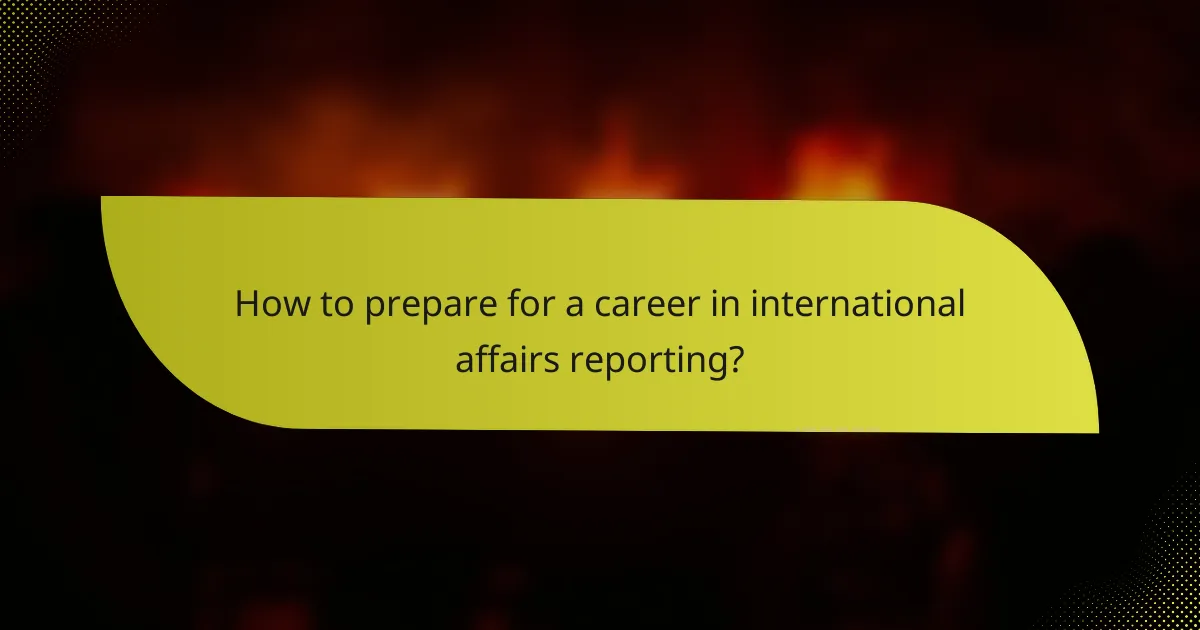
How to prepare for a career in international affairs reporting?
Preparing for a career in international affairs reporting involves acquiring relevant education, gaining practical experience, building a professional network, and staying informed on global issues. These steps will equip you with the necessary skills and insights to effectively cover complex international topics.
Obtain relevant education
A degree in journalism, international relations, or political science is often essential for aspiring international affairs reporters. Many universities offer specialized programs that focus on global issues, media ethics, and reporting techniques.
Consider pursuing internships or coursework that emphasizes foreign languages or cultural studies, as these can enhance your understanding of diverse regions and improve your reporting accuracy.
Gain practical experience
Hands-on experience is crucial in international affairs reporting. Seek internships at news organizations, NGOs, or governmental agencies that focus on international issues. This exposure will provide valuable insights into the workings of global affairs and media.
Freelancing for smaller publications or starting a blog on international topics can also help you build a portfolio. Aim to cover a variety of issues, from diplomacy to humanitarian crises, to showcase your versatility.
Build a professional network
Networking is vital in the field of international affairs reporting. Attend industry conferences, seminars, and workshops to meet professionals and gain insights into current trends and challenges.
Join organizations such as the International Press Institute or regional journalism associations. Engaging with peers and mentors can lead to job opportunities and collaborations that enhance your career prospects.
Stay informed on global issues
To report effectively on international affairs, you must stay updated on current events and global trends. Regularly read reputable news sources, journals, and reports from think tanks and international organizations.
Consider subscribing to newsletters or podcasts that focus on global issues. This will help you develop a well-rounded perspective and identify emerging stories that may require coverage.
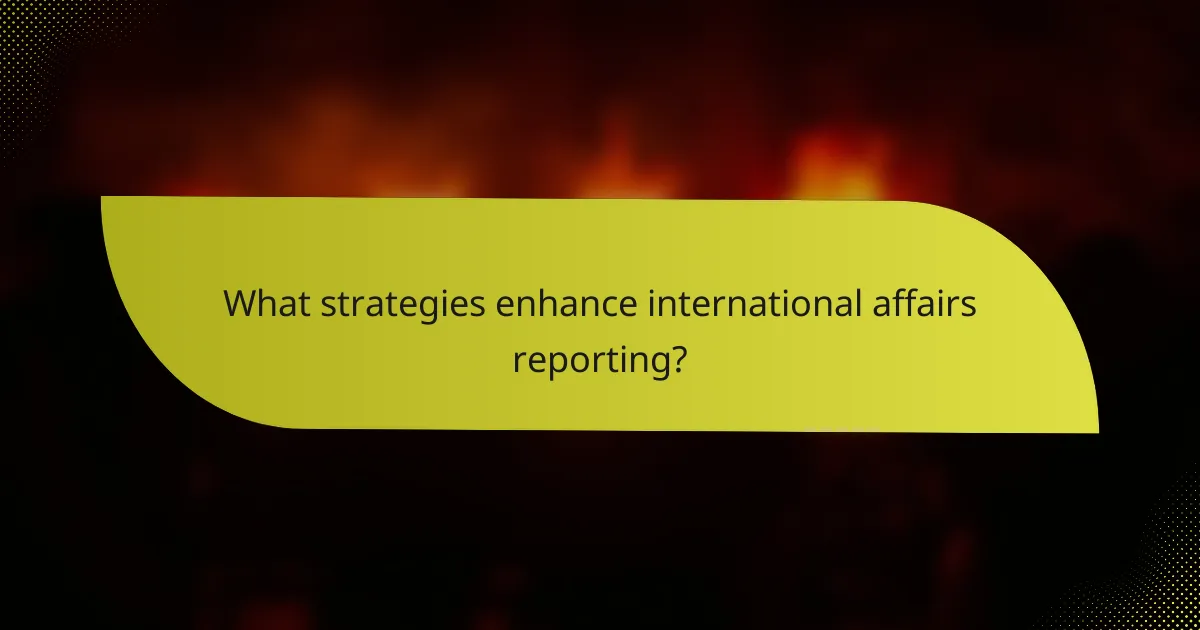
What strategies enhance international affairs reporting?
Effective international affairs reporting relies on a combination of diverse sourcing, community engagement, technological tools, and a distinctive reporting style. These strategies not only improve the depth and accuracy of coverage but also enhance the credibility of the reporting.
Utilize diverse sources
Relying on a variety of sources is crucial for comprehensive international affairs reporting. This includes government publications, academic research, local news outlets, and expert interviews. By incorporating multiple perspectives, reporters can present a more balanced view of complex issues.
Consider using both primary and secondary sources. Primary sources, such as firsthand accounts or official documents, provide direct insight, while secondary sources can offer context and analysis. Aim for a mix that includes local voices to enrich the narrative.
Engage with local communities
Building relationships with local communities is essential for authentic international reporting. Engaging with residents and local organizations can uncover stories that might not be visible through traditional channels. This grassroots approach often leads to richer, more nuanced reporting.
Attend community events, conduct interviews, and participate in local discussions to gain insights. Be mindful of cultural sensitivities and strive to represent the community’s voice accurately. This engagement fosters trust and can lead to more reliable information.
Leverage technology for reporting
Technology plays a vital role in modern international affairs reporting. Tools such as social media platforms, data analysis software, and mobile journalism apps can enhance the reporting process. These technologies allow for real-time updates and broader audience reach.
Utilize data visualization tools to present complex information clearly. For instance, infographics can help convey statistics about international trade or migration patterns effectively. Stay updated on emerging technologies to continuously improve reporting methods.
Develop a unique reporting style
Creating a distinctive reporting style helps to engage audiences and establish a reporter’s brand. This can involve a specific tone, narrative techniques, or a focus on particular themes within international affairs. Consistency in style builds recognition and trust among readers.
Experiment with different formats, such as long-form articles, podcasts, or video reports, to find what resonates best with your audience. Pay attention to feedback and adapt your style to maintain relevance and interest in a rapidly changing global landscape.
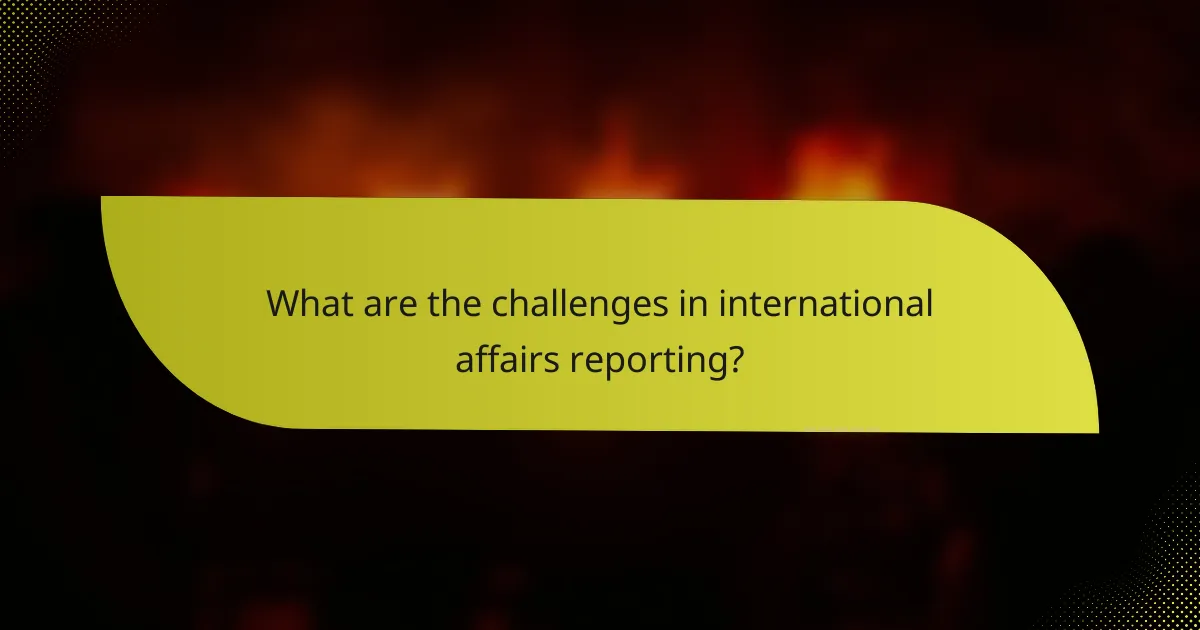
What are the challenges in international affairs reporting?
International affairs reporting faces several challenges, including access to reliable information, understanding complex geopolitical contexts, and maintaining objectivity. These obstacles can significantly impact the accuracy and depth of coverage in this field.
Access to reliable information
Accessing reliable information is a fundamental challenge in international affairs reporting. Journalists often rely on various sources, including government statements, NGOs, and local news outlets, which may have differing levels of credibility.
To navigate this, reporters should cross-check information against multiple sources and be cautious of biases. Utilizing established databases and networks can also enhance the quality of information gathered.
Understanding complex geopolitical contexts
International affairs are often influenced by intricate geopolitical factors, making it essential for reporters to grasp the historical and cultural backgrounds of the regions they cover. This understanding helps in interpreting events accurately and providing context to readers.
Reporters should invest time in research and engage with experts in international relations to deepen their knowledge. Keeping abreast of current events and historical trends can aid in making sense of ongoing developments.
Maintaining objectivity
Maintaining objectivity is crucial in international affairs reporting, as personal biases can skew the portrayal of events. Journalists must strive to present facts fairly and avoid sensationalism, which can mislead audiences.
To uphold objectivity, reporters should adhere to ethical guidelines, seek diverse perspectives, and clearly differentiate between opinion and fact. Regular self-reflection on personal biases can also help in achieving a balanced viewpoint.
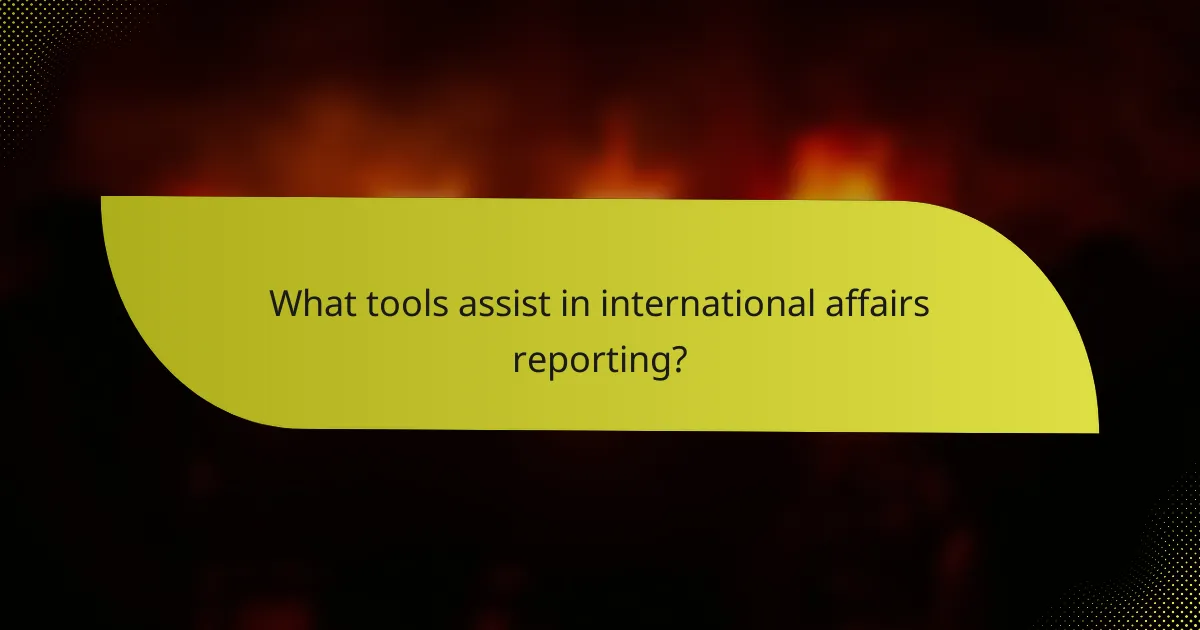
What tools assist in international affairs reporting?
International affairs reporting relies on various tools that enhance research, communication, and analysis. Key resources include digital platforms for information gathering, communication tools for networking, and analytical software for data interpretation.
Research databases
Research databases are essential for accessing a wide range of information on international issues. Platforms like JSTOR, ProQuest, and Google Scholar provide scholarly articles, reports, and publications that can inform reporting. Journalists should prioritize databases that focus on geopolitical studies and international relations.
Communication tools
Effective communication tools are vital for connecting with sources and experts in international affairs. Email, secure messaging apps like Signal, and video conferencing platforms such as Zoom facilitate interviews and discussions. Journalists should ensure they are familiar with these tools to maintain clear and secure communication.
Data analysis software
Data analysis software helps reporters interpret complex information and trends in international affairs. Tools like Excel, Tableau, and R enable journalists to visualize data and present findings clearly. Understanding how to use these tools can significantly enhance the depth and credibility of reporting.
Social media platforms
Social media platforms serve as real-time sources of information and public sentiment on international events. Twitter, Facebook, and LinkedIn can provide updates, expert opinions, and grassroots reactions. Journalists should actively monitor these platforms to stay informed and engage with audiences effectively.
Fact-checking resources
Fact-checking resources are crucial for verifying information in international reporting. Websites like Snopes, FactCheck.org, and PolitiFact help journalists confirm the accuracy of claims. Utilizing these tools can prevent the spread of misinformation and enhance the reliability of reports.
